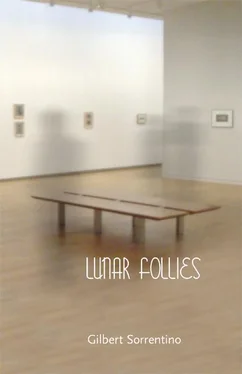A Collage
On a kind of moor, as it is called in England, there sits a castle, much the worse for the neglect of centuries, within which a small band of elderly men regularly discuss the elements of natural philosophy, while toying each with his soap-bubble set. These sets are unusual, to say the least, configured, as each is, of a glass ball and a star game, the latter secretly manufactured, or so it is rumored, in either the Palace Hotel or the Golden Key Hotel, both located in Jersey City, New Jersey, a city which Max Ernst (or perhaps Tristan Tzara) called a “surrealist box,” an odd cognomen for a city best known for its extraordinarily lascivious, not to say obscene portraits of the lewd twins, Ondine and Rose Hobart. Some of the elderly men occasionally mutter of the lost bookstalls of Fourth Avenue in Old Manahatta, which, some aver, they frequented every night with, as one likes to shout in a cracked, phlegmy voice, “torch and spear!” Another, almost invariably, begins, at this precise moment, to read, for the first of three or four times, The Children’s Party, a “compelling, compulsively readable” memoir of a man who humped not only his sister and his mother, but did so as a practicing, militant homosexual, a member of the Republican Party of Alabama, and a storied bore.
“A Legend for Fountains,” a portrait of the castle’s original tenant, Sir Joshua Nymphlight, has been well-nigh obliterated by the dirt, soot, and smoke of centuries, which may be, or so the jape goes, all to the good, seeing that Sir Joshua dreamed the forbidden aviary dream, that fearsome dream sometimes known as “the green dream,” “the fairy dream,” or, most often, here on the windswept moor, “Jack’s dream.” There are stories still told by rosy, and, of needs, dancing fireplace light, of the riotous midnights, the hearts on velvet sleeves, and the unspeakable services rendered Sir Joshua and his rakehell friends by Tilly Losch, one of the famous whores of indeterminate sex of that corrupt era we now call by the simple yet ominous term, the “Object Era.” Pharmacies, or what we now know as pharmacies, but which were then simple “egypts,” did a stupendously lucrative business when the crazed whoremongers and their bawds and morphodites — under contract to Mrs. Losch — spilled forth from Sir Joshua’s chambers of sin and perversion to avail themselves of salves and poultices to still the burning of the “codpiece fever,” as Ben Jonson termed it, that consumed them. These revelers christened the castle the Pink Palace, and in later years, the sounds of timbrel and calliope, of lute and viola da scuccia and bonzophone emanating from the fabled pile in the rendition of such airs as “Follow Thy Faire Sunne,” “Baby Marie,” and “Oh You Beautiful Doll” drove the livestock, for miles around, into that special frenzy peculiar to England and all things English, from their crown jewels and greasy bangers to their derby days and dumb Irish jokes.
During the long evenings and longer nights of droning argument and wayward discussion among the elderly sages, bumpkins, reprobates, drunks, and others who comprised “the Group,” as the castle’s devotees of unabashed sloth were thought of by the bemused if essentially moronic townspeople, Paul and Virginia often frequented one of the small shire’s penny arcades, the one, incidentally, that featured — proudly — three vaguely perverse portraits of Lauren Bacall in her salad days: one as a Medici princess, one as a Medici prince, and one as a Medici commoner. The background, in each of these depictions of the famed star, was, so the portraitist was supposedly heard to say, the Hôtel du Cygne in Paris, the deluxe establishment that had been the dream and triumph of Mrs. Spyros Apollinaris, and that patterned the configurations of its rooms and suites on that lady’s manipulations of her specially designed “solar set,” a kind of ultra-sophisticated ouija board that was the final creation of Rose des Vents, the celebrated fundraiser, artisan, marathon runner, and secret cocksucker to the stars, who was, to one and all in the demimonde, Mademoiselle Cassiopeia.
Paul and Virginia almost always found themselves, toward dawn, in the corner of the penny arcade known as the Grand Owl Habitat, a curious name for what was, in essence, a shooting gallery that had been rescued from the ruins of the Hotel Eden, a rambling apartment hotel designed, for some reason, now lost to students of the faux baroque, to look like the Pink Palace. The curious targets in the gallery were somewhat crude depictions, almost caricatures, of Juan Gris and his parrot, Griselda; the Grand Hotel Semiramis (where Jean Cocteau is said to have been surreptitiously “born again” into heterosexuality); and a miniature model of the Blue Peninsula, complete with its legendary corks and narcotic newspaper prose. Virginia almost always tried to hit each kind of target, the prize for success in this endeavor a cheap rhinestone tiara that had once belonged to Missy Vanessa, the “whore princess” of Omaha, or a hand-colored plate, imaging, in amateurish bas-relief, some sort of unrecognizable animal surrounded by infirm representations of a spavined horse, a sinking schooner, and a Chinese bottle with a dancing grasshopper inside its narrow fastness. “The Mooch,” who managed the arcade, a man known to many as the Ice Traveler, would show Virginia, and Paul as well, after Virginia’s inevitable, one might say predictable failure of marksmanship, a thimble forest with beehive, as perhaps, a consolation prize, and smilingly, or, as Paul thought, leeringly, call her the “Snow Maiden.” “Where’s the book with the marble,” Paul would ask, almost as if instructed to do so, “John Donne’s keepsake?” But there was, of course, no “book with the marble,” as Paul well knew. The Mooch, who greatly disliked Paul because of the young man’s obvious intimacy with Virginia, would offer him, in lieu of this imaginary “book,” a book with a window, a dressing-room for exhibitionists, a pantry ballet, and Jacques Offenbach’s last cheese carton, one made of wood and perfect for holding scores of baseball cards. Strained laughter ensued.
As this nocturnal adventure ran its course, as it did on many evenings, within the confines of the penny arcade, the elders in the castle set their gaming tables in preparation for an evening of Black Hunter, a version of the Korean board game of great antiquity, Box with Corks and Other Corks. The winner of the previous month’s marathon match would dress himself in the clothing which closely imitated that worn by Rose Castle, the semi-mythical madam of the brothel known, as far back as the Crusades, as Taglioni’s Jewel Casket; and a romantic ballet, homophobically yet courageously perverse in its brutal choreography, would be performed by “Rose Castle” atop a souvenir case wheeled in by the masked men affectionately called “The Little Mysteries.” This band of assistants had been in charge of wheeling the souvenir case here and there, whenever and wherever required, for as long as anyone could remember, as far back, as a matter of fact, as the castle’s moldering records went. Then the game began, its opening always the same, the traditional, staid, yet excruciatingly impenetrable and inexplicable move that had been christened, by Mad King Ludwig and The Three Musketeers, “Glass in Naples.” As the game progressed, a parlor constellation, with both rattle and music box, was softly illuminated by two beautiful maids who were always known as Emily One and Emily Two. The Emilys would, at times, at the direction of a particularly playful elder, add a sand fountain that had graced Apollinaire’s Cuban mansion to the display, and sometimes, too, a slot machine that was believed by some to be the handiwork of the beautiful Caravaggio.
Читать дальше












